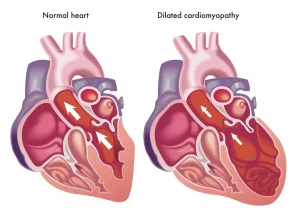Overview
Cardiomyopathy is a disease of the heart muscle in which the heart becomes enlarged, thickened, or rigid, affecting its ability to pump blood effectively. Over time, cardiomyopathy can weaken the heart and lead to heart failure, abnormal heart rhythms, or other serious complications. The condition may develop gradually or appear suddenly and can affect people of all ages. There are several types of cardiomyopathy, each with different causes and patterns of progression.
Symptoms
Symptoms of cardiomyopathy depend on the type and severity of the condition. Some individuals may have no symptoms in the early stages, while others experience significant limitations in daily activities.
Common symptoms include:
-
Shortness of breath during activity or at rest
-
Fatigue
-
Swelling of the legs, ankles, feet, or abdomen
-
Chest pain or discomfort
-
Dizziness or lightheadedness
In more advanced cases, symptoms may include:
-
Irregular or rapid heartbeat
-
Fainting or near-fainting episodes
-
Persistent cough, especially when lying down
-
Reduced ability to exercise
Causes
Cardiomyopathy can result from a variety of genetic, medical, and lifestyle-related factors. In some cases, the exact cause remains unknown.
Common causes include:
-
Inherited genetic mutations
-
Long-standing high blood pressure
-
Heart valve disease
-
Previous heart attack
-
Chronic alcohol use
-
Certain infections affecting the heart
-
Exposure to toxins or certain medications
Underlying medical conditions can damage the heart muscle over time and contribute to the development of cardiomyopathy.
Risk Factors
Several factors increase the risk of developing cardiomyopathy, either by directly affecting the heart or worsening existing heart conditions.
Key risk factors include:
-
Family history of cardiomyopathy or sudden cardiac death
-
High blood pressure
-
Diabetes
-
Obesity
-
Excessive alcohol consumption
-
Use of illicit drugs
-
Certain autoimmune or systemic diseases
The presence of risk factors does not guarantee cardiomyopathy but raises the likelihood of its development.
Complications
If not properly managed, cardiomyopathy can lead to serious and potentially life-threatening complications.
Possible complications include:
-
Heart failure
-
Dangerous heart rhythm abnormalities
-
Blood clots, increasing the risk of stroke or pulmonary embolism
-
Heart valve problems
-
Sudden cardiac arrest
The risk of complications varies based on the type of cardiomyopathy and how early treatment begins.
Prevention
Not all forms of cardiomyopathy can be prevented, especially those with a genetic cause, but certain measures can reduce risk and slow progression.
Preventive strategies include:
-
Managing high blood pressure, diabetes, and other chronic conditions
-
Limiting alcohol intake
-
Avoiding illicit drug use
-
Maintaining a healthy weight
-
Following a heart-healthy diet
-
Engaging in regular physical activity as advised by a healthcare provider
-
Seeking early medical evaluation for persistent heart-related symptoms
Early diagnosis, lifestyle modification, and ongoing medical care are essential for improving outcomes and reducing complications associated with cardiomyopathy.
Advertisement

